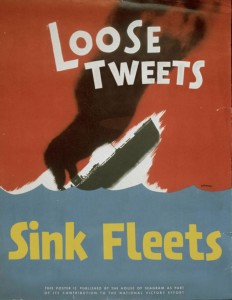Be sure to join the New Comm Biz Facebook Page or follow the Twitter account.

The Do Not Tweet List
- Don’t complain about your customers on Twitter. They are listening.
- DM is not IM. It’s not a secure communication channel.
- Disclose conflicts of interest: Clients, Competitors, Partners.
- Don’t get defensive about negative criticism of your company or products.
- Don’t publicize private issues or jeopardize the company’s working relationships.
- Unless soliciting community feedback is part of your product development, don’t tweet about products under development.
- Don’t post about company financials before an earnings call. This can get you and your company in trouble with the SEC.
- If you have a gripe about a coworker or your boss talk to them about it. Tweeting about it is passive aggressive and makes you and the company look bad.
- Don’t spam your personal account with irrelevant work promotions. Promoting work is fine if it’s relevant to your followers.
- Don’t think having an anonymous account makes any of the above okay.
Alternately named “Loose Tweets Sink Fleets.”
To quote my good friend and colleague Jeremy Meyers:
“Twitter is very conducive to posting without thinking.”
There are many instances of company and employee tweets gone wrong. A tweet can be a 140 character time bomb. Time and time again people have said things on Twitter that have blown up in their face.
Most recently Twitter developer Alex Payne posted “If you had some of the nifty site features that we Twitter employees have, you might not want to use a desktop client. (You will soon.)”
While on one level this may seem benign enough. Alex is excited about the product that his company is making. The problem is that Twitter has grown to the size that it is because of third party developers. Twitter has obviously made a decision to compete more and more with the very developers that helped make them popular. That single tweet tipped their hand and surely caused Twitter a flurry of phone calls, emails and headaches right before their first developer conference.
This is a huge challenge for companies. You want to be open and social but you don’t want to leak information or send mixed messages in the market. What fascinated me the most was the way Twitter responded. They responded like a large company not the social media darling that they are.
MG Siegler has a great post on a reporter/blogger perspective of the leaked Twitter tweet.
So why do Twitter employees (and others) get mad? Because we’re amplifying the statement Payne made which they think he shouldn’t have. This is nothing new, it happens all the time in all forms of media. And companies hate it because they want to be in control of the message. But the fact of the matter is that he made an interesting statement, and people are clearly interested in reading about it, reading thoughts about it, and leaving their own comments about it.
Employees Don’t Be Stupid
This problem isn’t going away. Just like sending an email to the wrong person or replying in the wrong IM window hasn’t gone away, Twitter is just one more channel for miscommunications. The problem is that, unlike IM or email, it’s a very public forum.
Think before you tweet. Anytime you’re going to say something publicly, take just a split second to think about what you’re posting. The below list is meant for your personal account when posting about work related items. This is my first stab at the list so I’d love some feedback.
The Do Not Tweet List
- Don’t complain about your customers on Twitter. They are listening.
- DM is not IM. It’s not a secure communication channel.
- Disclose conflicts of interest: Clients, Competitors, Partners.
- Don’t get defensive about negative criticism of your company or products.
- Don’t publicize private issues or jeopardize the company’s working relationships.
- Unless soliciting community feedback is part of your product development, don’t tweet about products under development.
- Don’t post about company financials before an earnings call. This can get you and your company in trouble with the SEC.
- If you have a gripe about a coworker or your boss talk to them about it. Tweeting about it is passive aggressive and makes you and the company look bad.
- Don’t spam your personal account with irrelevant work promotions. Promoting work is fine if it’s relevant to your followers.
- Don’t think having an anonymous account makes any of the above okay.
Companies Focus on Education not Control
Your employees are smart but not perfect. Instead of trying to control employees we need to educate them. Remind them regularly that there are just some things they shouldn’t talk about in any public communications. You can just throw open the doors and expect there to not be any mistakes. Learning has to happen and it happens through training or trial and error.
We have media training for executives before they make public statements why not employees?
What kind of training do you have for your employees around social media?
Join the New Comm Biz Facebook Page or follow the Twitter account.
Photo Credit by Brian Lane Winfield Moore
Similar Posts:
- Social Media Is Not A Back Channel
- Don’t Overreact to Your Social Media Mistakes
- What Twitter Can Learn From @facebook About Using @twitter and Facebook
# of Comments 8
# of Comments 4
# of Comments 5